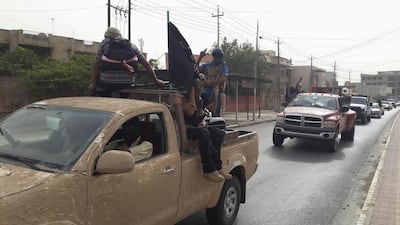A spring day in Mosul in 1995 and male and female college students are picnicking in Iraq’s second city. Most of the girls aren’t wearing hijabs. Those who can remember this will be struck by the change that came about by 2002. By then, not wearing hijab was enough to tarnish a young woman’s reputation. How the city turned socially conservative in just a short period of time is yet another facet of Mosul’s takeover by Islamists.
Islamists became a very real presence in the city in the early 1990s. They exploited the people’s anger at economic sanctions and their frustration with the Baath regime. They mainly comprised affluent doctors, pharmacists and merchants, all of whom were influenced by the Muslim Brotherhood. The economic sanctions did not affect these well-off “practising Muslims” but when Saddam Hussein launched his “Faith Campaign” – teaching the Quran at school and building an Islamic university – it seemed the right time to make a bid for influence.
Saddam was seen as attempting to win over the religious camp, which gave the Brotherhood sympathisers a new platform to speak out. It was obvious that the Islamists were organising and gaining traction and many secretly wondered why Saddam seemed to be turning a blind eye and indirectly endorsing their activities. These included new school shoes and school books for the children of the many families impoverished by years of sanctions.
Unsurprisingly, many people saw the Islamists as a ray of hope in hard times. They also worked hard to strengthen ties with Mosul’s high society. Islamists set an expensive fashion – building private mosques and undertaking trips to Mecca. It became the rage and the city’s socialites thought it a novel way to spend ostentatiously.
Meanwhile, the Islamists used language that equated secularism with “immoral westernised values”. With the ongoing “Faith Campaign” fully backed by Saddam, the Islamists’ agenda confusingly also appeared to have the regime’s approval. Even though these Brotherhood sympathisers were not Baathists, they cannily offered no public criticism of the ruling party. In private, however, the talk was all about the deterioration of the Arab states and Iraq in particular because their government were not religious.
As their influence continued to grow, they started on phase two of the plan – a culture war against non-Islamists by stigmatising certain acts.
The list of taboos included failing to show up at the mosque for Friday prayers, socialising with people of the opposite sex, attire that did not conform to Islamic principles and the failure to affirm that Islamic rule was the way forward for Mosul and for Iraq. People who committed such “offences” were accused of being atheists, westernised or Baathists.
In the immediate aftermath of the Baath regime’s fall, most Iraqis were cautiously optimistic even though their country’s future seemed unclear. But by mid 2003, things took a different turn. I witnessed nearly 500 women led by Dr Samia Mahmood, a well-known gynaecologist, shouting Islamist slogans in front of American Humvees. They were not protesting against the US occupation, but against a liberal Kurdish woman with some influence within US military circles. The doctor and others chanted: “No God but God! No, no to westernisation”.
Having stigmatised any association with the US occupiers, they also managed to hijack Arab-Sunni representation within the first US-formed municipality council. Several Islamists, who were already respected members of Mosul society, managed to achieve pivotal administrative positions in institutes of higher education.
In a politically astute move, the Islamists argued against the reappointment of Baathists to key bodies. They had been pardoned during the de-Baathification campaign and were able to resume their duties, but the Islamists were vociferous in their opposition. I remember incredulously hearing a member of the Islamic Party of Iraq justify his opposition to a Mosul university professor. “The Shiites are going to vote for the Shiites, the Kurds will vote for the Kurds, but the Sunnis might vote for him”.
It was a cynical and sectarian approach and carried within it the multiple contradictions inherent in the Islamists’ strategy – appearing to work with the new government in Baghdad and the coalition forces, while promoting a partisan discourse against “the Persian influence” and cheering the language of “resistance” against the American occupation.
The callous campaign obviously extended to women. For example, in the mid 1990s, a prominent Islamist wrote a story which implied that if a woman was raped she had best become a suicide bomber and attack the infidel.
That was then and recent conversations with people in Mosul indicate that the season of radicalisation may have run its course now that ISIL – the most extreme version of Islamist – has declared even members of the Islamic Party to be heretics.
Rasha Al Aqeedi left Mosul 18 months ago and now lives in Dubai. She is a researcher at the Almesbar Studies and Research Centre


